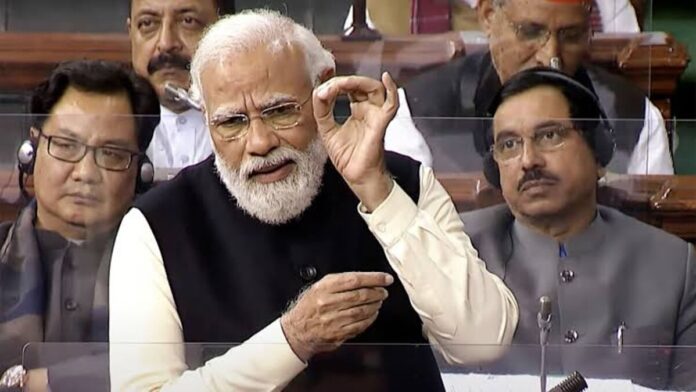Prime Minister Narendra Modi attacked the Congress once more in his final speech to the legislature before the Lok Sabha elections, focusing further on the party’s caste policy.
Replying to the debate on the Motion of Thanks in the Rajya Sabha, Modi said: “The Congress which never gave complete reservation to OBCs, never gave reservation to the poor of the general category, which did not consider Babasaheb Ambedkar worthy of Bharat Ratna, kept giving Bharat Ratna only to its family… they are now preaching and teaching us the lesson of social justice.”
He proceeded to read out a letter by Jawaharlal Nehru as PM to state CMs of the time, saying: “I am reading out its translation — ‘I dislike any kind of reservation, more particularly in services. I am strongly against anything which leads to inefficiency and second rate standards…’. That is why I say that they (the Congress) are against it (reservation) by birth… Had the government recruited at that time and promoted them from time to time, they would have been here today.”
On October 15, 1947, two months after independence, Nehru began writing to chief ministers of various states and then leaders of province administrations. Four months before his death, on December 21, 1963, he carried on with the practice.
These letters presented Nehru’s political views on a variety of subjects, including foreign relations, citizenship, and democracy.
According to legal expert Madhav Khosla’s compilation of Nehru’s letters to chief ministers, the former prime minister mentioned reservations in a letter dated June 27, 1961.
At this point, Scheduled Castes, Scheduled Tribes, and the Anglo-Indian community were given ten-year reservations in the Lok Sabha and State Legislatures under Article 334 of the 1950 Constitution. Following that, the Article was changed in 1969, 1980, 1989, and 1999. Currently, reservations have been extended for 70 years for the Anglo-Indian community and 80 years for the SC/ST populations.
Nehru begins the letter by discussing ‘breaking free from the long-standing practice of giving special rights and reservations to this caste or that group’.
He added that a recent meeting of the CMs had “laid down that help should be given on economic considerations and not on caste”, and proceeded to say: “It is true that we are tied up with certain rules and conventions about helping the Scheduled Castes and Tribes. They deserve help but, even so, I dislike any kind of reservation, more particularly in Services. I react strongly against anything which leads to inefficiency and second-rate standards. I want my country to be a first class country in everything. The moment we encourage the second-rate, we are lost.”
Nehru then argued that “the only real way to help a backward group is to give opportunities of good education” , especially “technical education”, and said, “everything else is provision of some kind of crutches, which do not add to the strength or health of the body”.
Nehru said the Congress government had made two decisions in that regard: universal free elementary education, and scholarships. “I lay stress on the bright and able boys and girls because it is only they who will raise our standards. I have no doubt that there is a vast reservoir of potential talent in this country, if only we can give it opportunity. But if we go in for reservations on communal and caste basis, we swamp the bright and able people and remain second-rate or third-rate,” he said.
“ I am grieved to learn of how far this business of reservation has gone based on communal considerations. It has amazed me to learn that even promotions are based sometimes on communal or caste considerations. This way lies not only folly, but disaster. Let us help the backward groups by all means, but never at the cost of efficiency,” he concluded.




